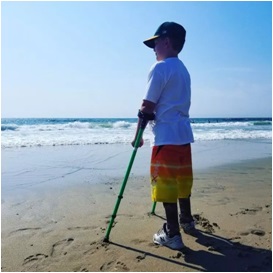October is National Spina Bifida Awareness Month, a perfect time to be educated about the impact disability can have on the family. According to the Center for Disease Control (CDC), 1,500 pregnancies are affected by spina bifida annually. That’s roughly 1 out of every 2,630 will be born with spina bifida in a year, making it the most common permanently disabling birth defect in the United States.
Spina bifida is a “neural tube defect” beginning within the first few weeks of pregnancy. It’s the result of the baby’s neural tube — which develops into the baby’s spinal cord — not closing properly, sometimes leaving the spinal cord protruding from the body in a fluid-filled sack. This usually requires immediate surgery after birth, or even before birth, as various types of antenatal surgery have become more common.
The discovery of this birth defect can be shocking, even overwhelming for parents as they begin to wonder how they will cope with their child’s needs. These reactions can be common and are quite understandable. Dr. David W. Carroll, Ph.D summarizes the familial experience in his text “Families of Children with Developmental Disabilities: Understanding Stress and Opportunities for Growth”:
“Parents of children with disabilities confront a number of challenges and may be at risk for depressive or trauma-related symptoms. Changes in family roles and routines can cause stress for parents, siblings, and extended family alike as they confront multiple issues, including behavioral problems and frequent healthcare needs. Despite such challenges, many families derive a sense of meaning from facing their difficulties in a positive way.”
The shock and fear incited by such a diagnosis can lead parents to make hasty decisions about their child’s life. According to the Guttmacher Institute, about 13% of abortions in the United States, are committed due to the possible health issues with the child (an estimated 130,000-150,000 children each year). A combination like this can cause deep grief and agonizing tension for each parent and in the relationship, but it doesn’t need to be suffered alone.
Each person and each illness is unique. No two children with spina bifida are exactly alike, and each child’s health issues will be particular to them alone. Spina bifida itself has varying degrees of severity, from less to more severe: spina bifida occulta, closed neural tube defects, meningocele, and myelomeningocele. The more severe forms of spina bifida can bring other neurological malformations.

Does this mean that those children, their parents and their families are cursed with facing a lifetime of stress and depression? Is there anything positive that can be said about cases of spina bifida?
Absolutely. There are many people who live with spina bifida and their family and friends’ support all around them. “Overall, a warm and supportive home environment with good family communication in general has been linked to better chronic illness outcomes, including better illness management” (Helgeson & Palladino, 2012). One mother expressed their journey on the support blog, The Mighty:
“This is what spina bifida looks like. Spina bifida is a big mountain to tackle, but we do it one step at time, with crutches and leg braces. My [son] lives big and goes hard every day all while smiling and giggling. This life is full of miracle milestones and first experiences that are momentous. We have hard days and sometimes tears, but the next day we get up and try again. I use the term ‘we’ a lot. Jarrett does not live SB alone. We, his family live it and walk it with him. Ups, downs, highs and lows, we do it together. The buds and thorns come and they go, but the beauty of it all is one to rejoice. This is a photo of [him] age 8. He dreamed one day he would walk to the ocean and he did. This is a picture we cherish because he redefines his abilities every day. Nothing stops this amazing boy.” — Kerri K.
Support, resources and therapeutic interventions are extremely helpful in assisting parents and families along the path of loving and caring for their child.
Divine Mercy University (DMU) offers graduate programs in psychology and counseling to prepare people to be the support a parent or family might need as they embrace and adjust to new routines for their child. Courses like Marriage and Family Counseling (COUN 670) and Relationship and Intervention Skills (PSY 555) detail how families work, analyze what stressors can cause breakdowns of communication and ultimately relationships, and present strategies on how to help a family grow during difficult moments. DMU students who graduate from its programs go on to become professionals well equipped to lend a compassionate ear and offer practical help with a vision of the transcendent value of life.
A diagnosis of disability can be challenging, but it doesn’t have to be tragic. There are many resources and ways of receiving support and growing in the process. Consider being part of that help for families. (If you feel called to be one of those to guide people in such a time, consider a graduate degree from Divine Mercy University.)
Request information about psychology and counseling programs offered at Divine Mercy University.

